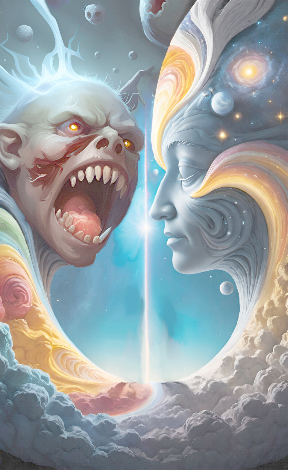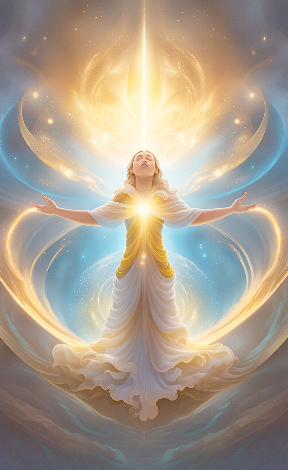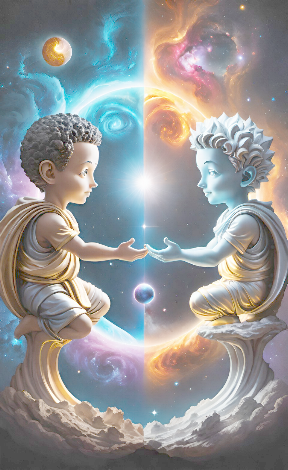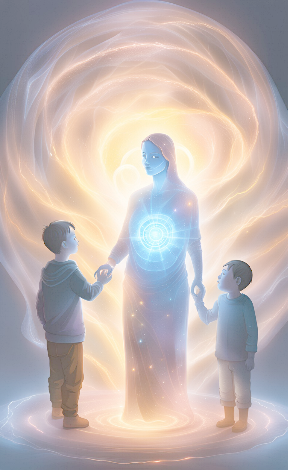Love and Its Meaning. Feelings, Fear, and Self.
Excerpts from this summary are taken from the book "Conversations with God". Author: Neale Donald Walsch.The Highest Thought is always the thought that contains joy.
The Clearest Words are those that contain truth.
The Greatest Feeling is what you call love.
Neale Donald Walsch (Conversations with God)
Love and Fear
Any thing, any phenomenon cannot exist without its opposite. Everything can only be known by comparison. Therefore, for love to exist, and for one to know Self as pure love, its direct opposite must exist. Thus, the Original Creator intentionally created a great polarity during the universe's inception: the direct opposite of love; everything that love is not; and what is now called... fear.
ALL HUMAN ACTIONS are motivated at a deep level by one of two feelings, one of two words in the language of the soul: fear or love. These are the opposite ends of the great polarity. These are the two points—Alpha and Omega—that allow the system we call "relativity" to exist. Without these two points, without these two ideas or feelings, no other idea or feeling could exist. Every human thought, word, or deed is based on one of these feelings. All other thoughts arise from these two. These are simply different versions, different variations on the same theme. No other choice exists, because there is nothing else to choose from. This is what could be called the Organizing Thought. It is either a thought of love or a thought of fear. It is the thought behind the thought behind the thought. It is the very first thought. It is the fundamental force. It is the fuel that allows the engine of human experience to run.
And this is how human behavior generates repeated experience after repeated experience. This is why people love, then destroy, then love again. There is always an oscillation from one feeling to another. Love organizes fear. Fear organizes love. Love organizes fear again... and so on. After all, the first thing a person usually worries about after saying "I love you" is whether they will hear it back. And even if they do, they immediately start worrying about losing the love they just found. Because of this, all actions become a reaction, a defense against loss.
Fear is the energy that compresses, closes, pulls in, runs away, hides, hoards, harms. Love is the energy that expands, opens, sends out, lets go, reveals, shares, heals. Fear wraps our bodies in clothes, love allows us to remain naked. Fear clings to what you have, love – allows you to give away everything you have. Fear grasps, love – touches with tenderness. Fear binds, love – releases. Fear gives birth to pain, love – relief. Fear attacks, love – transforms.
We were taught to live in fear, told that the fittest survive, the strongest win, the smartest succeed. Only precious few words were spoken about the glory of those who could give love. So you strive to be the fittest, strongest, smartest—in one way or another—and if you find you cannot outperform everyone in every situation, you fear losing, for you were told that not being the best means losing. However..., by choosing actions based on love, you will achieve more than survival, more than winning; you will achieve more than success. Only then will you fully experience the greatness of Who You Really Are and who you can be.
If only we knew that we are the most magnificent, most wonderful, most extraordinary creature ever created by God, you would never be afraid. For who can reject such wondrous perfection? Even God cannot find flaws in such a being. But we do not know Who We Are, and we think far less of ourselves.
The purpose, desire, and meaning of the human soul is to experience the highest, most perfect sensation of love imaginable. The soul needs feelings. The highest feeling is the experience of unity with All That Is. Therefore, the soul tries to feel everything so that it can be everything. This is the great return to the Truth that the soul yearns for.
The Soul's Purpose
From the literature on "physics" we know that white is not the absence of color. White is the combination of all existing colors. In the same way, love is not the absence of feelings (hatred, anger, lust, jealousy, greed), but the sum of everything that can be felt. Love is the total sum of everything. The final quantity. Simply everything. Therefore, for the soul to experience perfect love, it must experience every human feeling. How can one empathize with what one doesn't understand? How can one forgive another for what one has never experienced oneself? How can the soul be up if it has never been down, be left if it has never been right? How can it be warm if it has not known cold? Thus, we see simultaneously the simplicity and astonishing grandeur of the soul's journey. Finally, we understand what it needs:
The soul's task is to make a person choose splendor—to choose the best of Who He Is—without rejecting what he does not choose. The highest level of the soul never rejects what is not magnificent, but blesses it, seeing in it a part of itself that must exist for another part of itself to manifest.
The religious phrase "Love others as yourself" can be interpreted in different ways. One of its meanings is to love others, but also not to forget about yourself. And this is a very important point. Love for oneself! Love for oneself, or rather for self-improvement, is far from egoism. We brought our "Self" into this world of relativity for many reasons, and one of them is to have tools with which we can know and experience Who We Really Are. By perfecting ourselves, we become stronger and more perfect instruments of the Almighty Creator. Before we give our love to people and give something away, we must first have that something.
Our personal relationship with ourselves is the most important link in the evolutionary process. In essence, they are not related to another person, but since another is involved, they are entirely related to the other. We need the other to realize ourselves. To once again test through experience whether we correspond to the idea of ourselves as radiating our love to others or not. And the law of consciousness development, to some extent, forces us to give. For example, by giving in terms of knowledge, we free ourselves to receive other information, refine and strengthen previous knowledge, and so on. For this, we need others, to dedicate ourselves to them for our own sake. This is a divine dichotomy. It is a closed loop. So, when it is said: "Blessed are the Self-centered, for they shall know the One"—this is not such a radical statement. To know the highest part of your "Self" and remain centered on it—is that a bad goal for our life?
What does it mean to be self-centered? To constantly look at who You are, what you do, what you have, not at what is happening to another. It is not in the actions of another person, but in one's own responsive actions that a person finds salvation. Such is the law of love: only that person knows how to love especially well who is most centered on himself.
Therefore, first and foremost, we must establish a relationship with our own "Self." We must learn, strangely enough, to honor, cherish, and love our Self. First, we must see our Self as worthy, and then we can see another as worthy. First, one must see one's Self as blessed, and then one can see another as blessed. First, one must know one's Self as holy, and then one can recognize holiness in another. If we cannot properly love our Self, then we cannot truly love another properly. Relationships with others largely depend on how we relate to our Self.
Many people, for example, try to find love for themselves only through love for others. They think: "If I can love others, they will love me. I will become attractive and able to love myself." However, their love for others often ceases to be bipolar because the person becomes afraid to say a deserved "no" to another. In other words, treating another with love does not mean fulfilling all their desires.
Parents quickly grasp this with their children. And sometimes, punishing a child greatly helps in increasing their spiritual growth. Adults, in turn, find it not so easy to grasp this with other adults, just as one nation with another. But one must not allow despots with their despotism to flourish. This is demanded by both love for oneself and love for the despot. Therefore, some pacifist theories stating that the highest love does not require a forceful response to what one considers evil can be laid to rest.
Some people hate themselves because they feel there is no other person who loves them. This is a sickness. People are literally "sick with love." Because, in reality, other people do love them. But it doesn't matter. No matter how many people confess their love to them, it's still not enough.
And even if a person can finally believe that others (or someone specific) love them, their subsequent reactions will likely be similar to a defensive reaction against loss. For now, they are more concerned with how long they can hold onto this love. And the greater the love, the greater the fear they will confront. And to continue possessing this love coming from another person, they will begin to change their behavior in one direction or another. Thus, two people literally lose themselves in relationships. They enter into relationships hoping to find themselves, and instead—they lose themselves. Losing oneself in relationships is most often the cause of bitterness in the communication between two people.
Love of Partners
Two people become partners in the hope that the whole will be greater than the sum of its individual parts, only to find that it is less. They feel less self-sufficient than they were when they were alone. Less capable, less knowledgeable, less joyful, less attractive, less happy, less content.
All this is because they truly have become so. They have largely renounced who they are to have relationships and to maintain them. Relationships were never meant to be this way. But this is how even more people than we can imagine experience them.
The most common reason why people "fall in love" with each other is usually to satisfy needs. Everyone has needs. One needs this, the other that. Both partners see in each other a chance to satisfy needs. And both tacitly agree to an exchange. I will sell you what I have, and you will sell me what you have. A kind of barter. This is a deal. An obligation! But no one admits it to themselves.
And a person often even feels a direct need to get dividends from their investment. If they are going to love someone—great, but it would also be nice to receive no less a part of love in return. This is nothing but expectation. And this is the greatest source of human unhappiness. This is what separates a person from God and from love. Expectation is the enemy of love.
And if both partners consciously agree that the goal of their relationship is to create a favorable opportunity, not an obligation—an opportunity for growth, for full self-expression, for bringing their lives to the highest potential, for healing any false thought or distorted idea about themselves, and for complete fusion with God through the union of their two souls—if both partners take this vow instead of the vows they have taken until now—then the relationship has started on a very good note. They have started on the right foot. This is a very favorable beginning.
The Almighty loves each of us, unconditionally and ceaselessly. He even strives to fulfill all our desires and requests. However, sometimes we ourselves do not understand what we need and what we want. The desires of our subconscious are often hidden from our conscious mind.
The Almighty constantly tries to establish contact with us in various ways. The main and most frequently used way is not something external, but the voice within each of us. This is the first instrument he uses because it is the most accessible. Our inner voice is the loudest voice with which he speaks to us, as it is the closest. This voice tells us how true or false, right or wrong, good or bad everything else is. It is the radar that sets the course, steers the ship, chooses the travel route, if only you allow it to do so. This voice is telling you right now whether the words you are reading here are words of love or words of fear. This is how you can determine whether to listen to these words and advice or ignore them. Our Creator has never stopped sending us his teachers. His true teachers teach and call us not to fear, but to love.







